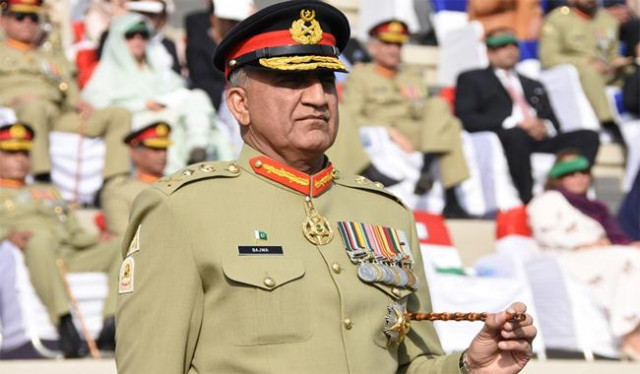T he Bajwa doctrine
The objective and intent appears to be a public debate on vital national issues

Army Chief Gen Qamar Javed Bajwa. PHOTO: ISPR
One may conjecture that as a citizen General Qamar Bajwa has as much right and freedom to express his views on national issues as anyone else. But the issue is that he is the Chief of Army Staff, and there is a history of the military’s intervention in politics directly and indirectly. Naturally, this raises a lot of questions about the intention, the timing and the tenor of his interview with a group of newsmen and women and anchor persons. Therefore, one needs to understand the objective and the intent of the interview, and its official naming by the Inter-Services Public Relations as the Bajwa doctrine.
The prevailing political climate of the country, disqualification of an elected prime minister by the Supreme Court, and finger-pointing and innuendoes by PML-N leaders towards the armed forces for almost a year now tell a lot about troubled civil-military relations. The issues packed into the doctrine could best be taken up with the democratic government. I am sure, some discussion on some issues, if not all must have taken place. And then there are constitutional forums like the Defence Committee of the Cabinet where all these issues, as they finally bear strongly on national security and stability, should have been placed on the formal agenda. Also, there have been, and can be, direct one-to-one meetings between the prime minister and the Chief of Army Staff, and all the good ideas in national interest could be discussed.
Deciphering the Bajwa Doctrine
The fact, the COAS went directly to the journalists in a close, ‘off-the-record’ meetings, shows some degree of disappointment with the civilian government or frustration to get policies and ideas mentioned in the doctrine implemented. It will be outrageous to say that the two are not on talking terms. This is also a way of strategic communications, conveying a strong political message to the civilian government about its failures or about the ‘vision’ or a preferred programme of action by the security establishment.
The objective and intent appears to be a public debate on vital national issues — the issues that we need to resolve, challenges that we face, and the direction of reforms and reconstruction in a holistic way from economy and politics to national security. It is hard not to take the doctrine as a charter of demand pushed towards the civilian government. Since the timing of the announcement of the doctrine is very close to elections, it is no less than an indictment of the civilian government.
Army seeks to quell speculation about ‘Bajwa doctrine'
The arrival of the doctrine, its publicity, debate and wider comment reflect the unsettled civil-military relations in the country. It seems our democratic process and its institutionalisation may take longer and more better efforts to achieve clear constitutional demarcation of constitutional boundaries of power of the institutions.
The doctrine has succeeded in generating a debate not only on the pressing national issues but also on the nature of civil-military relations and the unease that prevails between the two sections of the government. There cannot be any two opinions about the problems listed in the doctrine. The real challenges are in the domain of practical politics — capacity, leadership and national consensus on how to reform, secure and revive Pakistan.
Published in The Express Tribune, March 29th, 2018.
Like Opinion & Editorial on Facebook, follow @ETOpEd on Twitter to receive all updates on all our daily pieces.















COMMENTS
Comments are moderated and generally will be posted if they are on-topic and not abusive.
For more information, please see our Comments FAQ